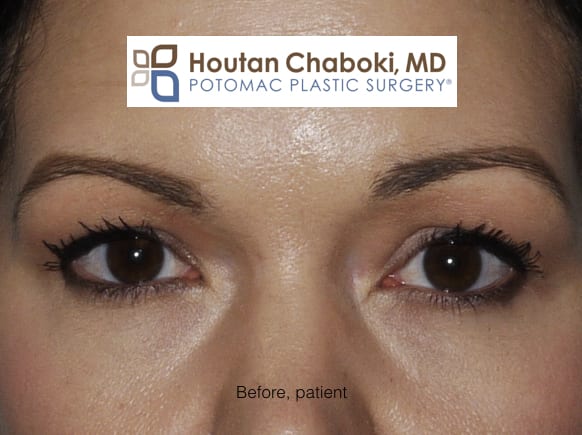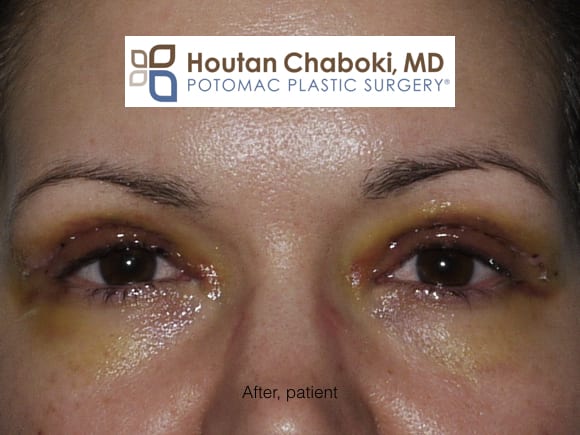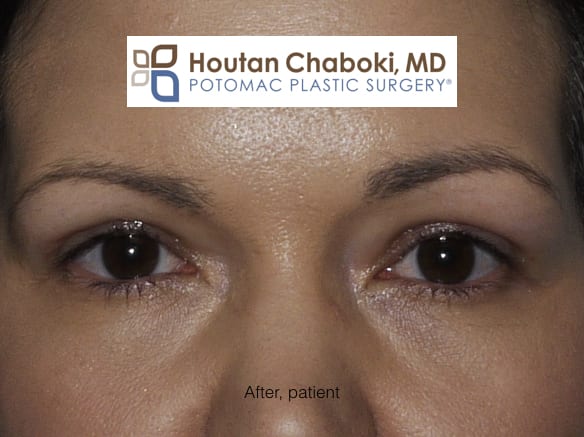After nonsurgical cosmetic treatments (ex. liquid facelift), the eyes are often the first area patients consider for plastic surgery. Upper eyelid excess skin crowds the eye and covers the eyelashes. Natural changes from age and sun damage to the eyes can make them look tired or smaller.

Before upper eyelid surgery. Examination reveals excess skin of upper eyelid area. Skin is crowding the eyelashes.
While nonsurgical injections of Botox® and Dysport® can help open up the eyes and elevate the brow, these office treatments provide temporary results. Certain conditions typically require surgery:
- loose or sagging skin that creates folds and covers eyelashes
- droopy upper eyelid that blocks vision
- fatty deposits in the eyelids that creates puffy appearance
Upper Eyelid Surgery and Recovery
Upper eyelid surgery is a relatively minor procedure that may be performed with local anesthesia. Discomfort that patients have described during upper blepharoplasty surgery is the initial numbing of the skin. The procedure takes usually less than an hour.

Few days after upper blepharoplasty by Dr. Chaboki. Bruising and swelling from upper eyelid surgery can travel to the lower eyelids from gravity.
Patients often do not need prescription pain medication beyond the first day, if at all. Lubricating ointment and cold compresses may be applied to reduce bruising and swelling. In addition, since upper eyelid surgery can be performed via local anesthesia, patients typically don’t experience nausea nor fatigue after eyelid surgery, which may occur after general anesthesia.
Bruising and swelling will occur after blepharoplasty, similar to any plastic surgery. As a result, some like to wear darkly tinted sunglasses for the first week or so after surgery. Read more methods to reduce swelling after plastic surgery in our blog.
Upper Eyelid Surgery combined with other Plastic Surgery
Upper blepharoplasty may be the first cosmetic surgery one gets done. Upper eyelid surgery, however, can be combined with other procedures. Brow lift and lower eyelid surgery are the most common complimentary procedures to upper eyelid surgery. Plastic surgeons may recommend additional cosmetic procedures as necessary for total eye rejuvenation. Read more about brow lift vs. upper eyelid surgery in a previous blog post.

Few weeks after upper blepharoplasty by Dr. Chaboki. Excess skin has been reduced and the eyes are more open. She appears more relaxed and rejuvenated, while still appearing herself.
The decision for plastic surgery is mutually determined by patient and surgeon based on many factors, including patient preference. Your plastic surgeon will suggest surgery for certain skin conditions, such as skin laxity, while other aesthetic concerns, such as Crow’s feet, may be treated with nonsurgical treatments.
Ideal candidates for cosmetic surgery include healthy individuals who have realistic goals. Take the first step and contact the office to determine if you’re a possible candidate for upper eyelid surgery or other aesthetic procedures to improve your appearance.
Share your thoughts below.

Leave a Reply